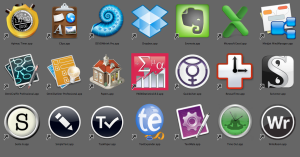In searching for motivations / reasons / justifications for writing and sharing more freely, I’ve stumbled upon the idea of Open Notebook Science, a practice of the Open Research community and inspired by open-source programming and open innovation. The Wikipedia entry explains,
The term Open Notebook Science was first used in a blog post by Jean-Claude Bradley, an Associate Professor of Chemistry at Drexel University. Bradley described Open Notebook Science as follows
… there is a URL to a laboratory notebook that is freely available and indexed on common search engines. It does not necessarily have to look like a paper notebook but it is essential that all of the information available to the researchers to make their conclusions is equally available to the rest of the world
—Jean-Claude Bradley
From a creativity standpoint, I like the idea that ideas get better by making the process transparent. So many research projects and creative works don’t ever make it to print (or screen, or stage, or gallery…) but it’s ridiculous to think that nothing could be learned from seeing them. So why don’t we share all of our projects – done, undone, and wish I’d never done?
The problem is that the dirty laundry of one’s
failed or unfinished work is so much less fun to share than their neat and tidy Perfect Pieces. More painful, more tedious, more revealing.
Good news is that we don’t know what projects are going to fail while we’re working on them. They are still exciting and new – until they start going sour. So to encourage the sharing of failures (important, because how can we learn if we don’t see failures?) we should encourage the sharing of PROGRESS and PROCESS.
The mess of the in-between is still beautifully optimistic and glittery with fresh enthusiasm.
To inspire you to share here are some photos of my messy work from before I really could call my dissertation a dissertation.
The messy notebooks of artists, writers, and scientists have always been my favorite part of the world of academia. It’s fair to say that I would never have joined the academic world if it weren’t such a perfect setting for scribbling quickly in my Moleskine(s). (And it’s Awesome how when I trace back through old notebooks, I see that on those late and confused nights I was actually onto something that eventually became real.)








